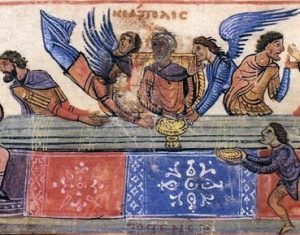The myth of Phineas and Harpies
Phineas lived in Salmydissos in Thrace, on the shores of the Thracian coast of the Black Sea, and was blind in both eyes. It was said that he was the son of Agenor or Poseidon or Phoenicus or Belus and that the gods blinded him because he prophesied to men what was to happen.
Against him the gods also sent the Harpies, and every time Phineas sat down at the table to eat, they flew from the sky and grabbed the food and what little they left for him they dried and soiled with their excrement, so that he could not to approach them.
With his divination skills Phineas knew that he would be freed from the Harpies, not from his blindness, when the Argonauts arrived in his country. Indeed, the Argonauts arrived there, desiring to learn of this road to Colchis, and found him old, in a miserable state, malnourished, isolated because of the foul smell that was around him and on him from the excrement of the Harpies, and without the possibility to die, since he had “earned” longevity.
Phineas promised the Argonauts that he would show them their course and ways to avoid danger, though they, in turn, pledged to free him from the Harpies. And the Argonauts organized the following plan to attract the winged monsters:
They set Phineus a rich table, and they suddenly rushed over with a great noise and seized the food. As soon as the winged sons of Boreas and the nymph Oreithyia, Zetis and Calais, brothers of Phineus’ wife, Cleopatra, saw them, they drew their swords and chased them through the air. And there was an oracle that the Harpies would die from the Northmen and they would die if they did not reach them. For the development of the story there are two versions, in one, the younger, the Harpies die, in the other they survive but hide.
According to Apollodorus, as the Boreas were chasing them, one fell into the Peloponnese, in the Tigris River, which was renamed by her to Arpy or Arpyia. The other left towards the Propontis, and then came as far as the Floating Islands, west of the Peloponnese, or near Zakynthos, or the Sicilian Sea, which were renamed Strophades, Islands of the Return, because, as soon as it arrived there, it turned back and fell near on the shore from exhaustion together with her pursuer; besides, they themselves are called strophades aellai in Orphic.
It is also said that the Boreas chased them as far as Kefallinia and at the top of Mount Ainos, where Zeus was worshiped with the epithet Ainiios, they begged him to help them catch the Harpies. And he helped them by encouraging them and renewing the strength in their legs. Other traditions want this prayer to be made on the Floating Islands, which were renamed Strophades, because the Boreas turned to Zeus.
According to Apollodorus, as the Boreades were chasing them, one fell into the Peloponnese, in the Tigris River, which was renamed by her to Arpy or Arpyia. The other left towards the Propontis, and then came as far as the Floating Islands, west of the Peloponnese, or near Zakynthos, or the Sicilian sea, which were renamed Strophades, Islands of Return, because, as soon as the Harpy arrived there, it turned back and fell near on shore from exhaustion with her pursuer.
It is also said that the Boreades chased them as far as Kefallinia and at the top of Mount Ainos, where Zeus was worshiped with the epithet Ainiios, they begged him to help them catch the Harpies.He helped them by encouraging them and renewing the strength in their legs.
According to Apollonius Rhodius, the Boreades pursued them as far as the Floating Islands, reached them but did not disturb them. Because Iris, the sister of the Harpies, or Hermes, came before them, preventing them from killing creatures who served Zeus.
So they swore not to disturb Phineas again and hid in a cave in Crete, on Mount Diktis. Iris returned to the sky and the Boreas turned back to meet the Argonauts again; from their movement they renamed the islands from the Floating to the Strophades.
Others transfer the story of the rescue of the Harpies to the Sicilian sea and convey that it was their father himself who stopped the Boreades, the Typhon

